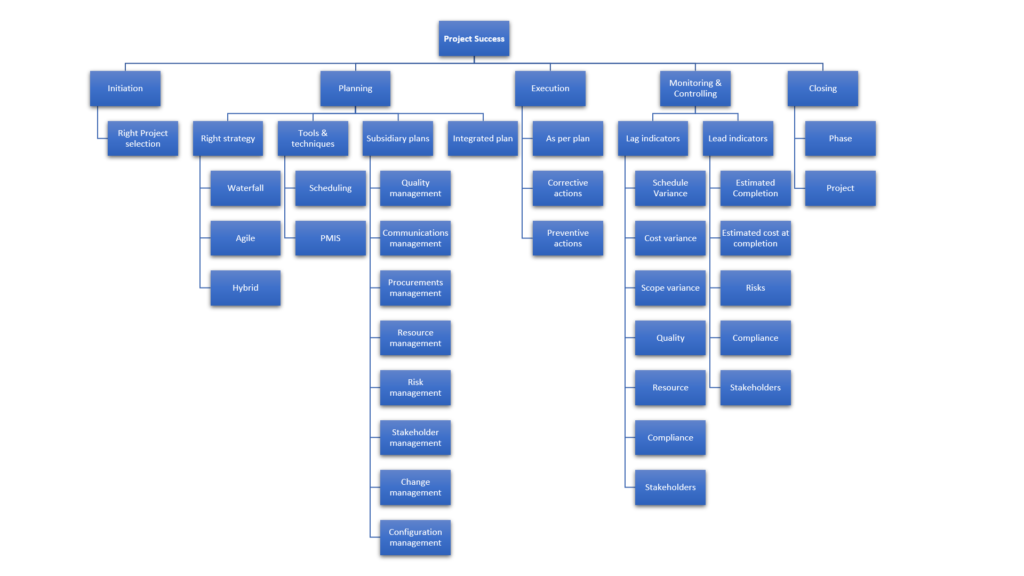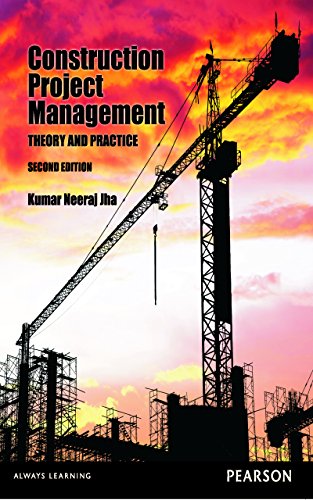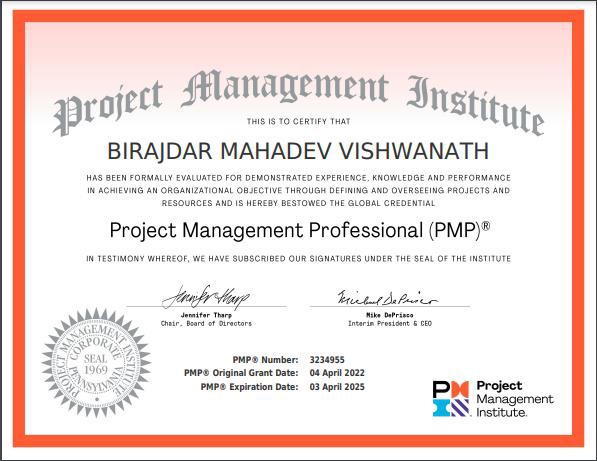The most popular project management certifications for 2023 are likely to be:
- PMP (Project Management Professional) from the Project Management Institute (PMI)
- PRINCE2 (PRojects IN Controlled Environments) from AXELOS
- CAPM (Certified Associate in Project Management) from the PMI
- ScrumMaster from Scrum Alliance
- Six Sigma from the American Society for Quality (ASQ)
- It’s worth noting that the popularity of certifications can vary depending on the industry and location, so it’s always a good idea to do some research and talk to professionals in your field before making a decision.
What is the qualification criteria for PMP certification?
To qualify for the PMP (Project Management Professional) certification from the Project Management Institute (PMI), an individual must meet the following criteria:
Education: A bachelor’s degree or the global equivalent, and a minimum of four years of project management experience, with at least 4,500 hours leading and directing projects, and 35 hours of project management education.
or
Secondary degree (high school diploma, associate’s degree, or the global equivalent) and a minimum of five years of project management experience, with at least 7,500 hours leading and directing projects, and 35 hours of project management education.
In addition to meeting the educational and experience requirements, an individual must also pass the PMP exam, which is a multiple-choice test that covers the PMBOK (Project Management Body of Knowledge) Guide. It is important to note that the PMI periodically review and update the criteria, so it’s recommended to check PMI website for most recent and accurate information.
For more information about the PMP certification Click here
What is the qualification criteria for prince2 certification
To qualify for the PRINCE2 (PRojects IN Controlled Environments) certification from AXELOS, an individual must meet the following criteria:
PRINCE2 Foundation: There are no formal prerequisites for the PRINCE2 Foundation certification. However, it is recommended that individuals have some prior knowledge of project management concepts and terminology.
PRINCE2 Practitioner: To qualify for the PRINCE2 Practitioner certification, an individual must first pass the PRINCE2 Foundation exam and have a minimum of five years of experience working in a project management role.
In addition to meeting the educational and experience requirements, an individual must also pass the PRINCE2 Practitioner exam, which is a multiple-choice test that covers the PRINCE2 methodology.
It is important to note that the AXELOS periodically review and update the criteria, so it’s recommended to check AXELOS website for most recent and accurate information.
What is the qualification required for CAPM certification
To qualify for the CAPM (Certified Associate in Project Management) certification from the Project Management Institute (PMI), an individual must meet the following criteria:
Education: A high school diploma or the global equivalent, and a minimum of 1,500 hours of experience working on a project team, or 23 hours of project management education completed prior to taking the exam.
In addition to meeting the educational and experience requirements, an individual must also pass the CAPM exam, which is a multiple-choice test that covers the PMBOK (Project Management Body of Knowledge) Guide.
It is important to note that the PMI periodically review and update the criteria, so it’s recommended to check PMI website for most recent and accurate information.
What is the qualification required for scrum master certification
To qualify for the ScrumMaster certification from Scrum Alliance, an individual must meet the following criteria:
Education: There are no formal prerequisites for the ScrumMaster certification. However, it is recommended that individuals have some prior knowledge of the Scrum framework and its principles.
Experience: There are no specific experience requirements for the ScrumMaster certification, but it is recommended to have practical experience working with Scrum.
Exam: In addition to meeting the educational requirements, an individual must pass the ScrumMaster certification exam, which covers the Scrum framework, its principles, and the role of the ScrumMaster. The certification exam is usually in form of a multiple-choice test.
It’s important to note that the Scrum Alliance periodically review and update the criteria, so it’s recommended to check the Scrum Alliance website for the most recent and accurate information. Additionally, there are other organizations that provide Scrum Master certification like Scrum.org and Scrum Inc. with slight variations in the certification requirements.
What is the qualification required to become six sigma certified
To become Six Sigma certified, an individual must meet the requirements set by the organization offering the certification. Generally, Six Sigma certifications are offered at different levels, such as Six Sigma Green Belt, Six Sigma Black Belt, and Six Sigma Master Black Belt. The qualifications for each level can vary, but typically include the following:
Six Sigma Green Belt: This level of certification typically requires an individual to have a basic understanding of Six Sigma principles and tools, and to have completed a Six Sigma Green Belt training course.
Six Sigma Black Belt: This level of certification typically requires an individual to have a more advanced understanding of Six Sigma principles and tools, to have completed a Six Sigma Black Belt training course, and to have demonstrated proficiency in leading Six Sigma projects.
Six Sigma Master Black Belt: This level of certification typically requires an individual to have a comprehensive understanding of Six Sigma principles and tools, to have completed a Six Sigma Master Black Belt training course, and to have demonstrated proficiency in leading complex Six Sigma projects and in coaching and mentoring others.
It’s important to note that the American Society for Quality (ASQ) and other organizations that offer Six Sigma certifications have specific requirements and periodically review and update their criteria, so it’s recommended to check their websites for the most recent and accurate information.
What are the other certifications offered by PMI apart from PMP?
The Project Management Institute (PMI) offers several certifications in addition to the PMP (Project Management Professional) certification, which include:
- CAPM (Certified Associate in Project Management): This certification is designed for individuals who are new to project management and have limited experience leading and directing projects.
- PgMP (Program Management Professional): This certification is designed for experienced program managers who lead multiple, related projects and oversee program managers.
- PfMP (Portfolio Management Professional): This certification is designed for experienced portfolio managers who oversee multiple, related programs and projects that align with an organization’s strategic objectives.
- PMI-ACP (PMI Agile Certified Practitioner): This certification is designed for individuals who have experience working in an agile environment and have completed a minimum of 21 hours of agile training.
- PMI-PBA (PMI Professional in Business Analysis): This certification is designed for business analysts who have experience in requirements management and have completed a minimum of 21 hours of business analysis training.
- RMP (Risk Management Professional): This certification is designed for professionals who have experience in identifying, assessing, and managing project risks.
- SP (Scheduling Professional): This certification is designed for professionals who have experience in developing, analyzing, and maintaining project schedules.
It is important to note that PMI periodically review and update the criteria, so it’s recommended to check PMI website for most recent and accurate information.
PMI has broadly diversified its certification offerings into General project management certifications, Project domain specific certifications, Skill specific certifications. As the offerings increases, it becomes complex to choose the right certification. This blog post will help you to choose the right PMI certification based on your present work experience and future career aspirations.
PMI General project management certifications applicable to all streams of project management
- PMP – Project Management Professional Certification still remain the flagship certification by PMI, because of its global recognition. This is not domain specific. Hence for anybody who want to understand predictive project management, agile project management and hybrid project management, this is ideal. If you have around 4 years of work experience after graduation, and if you are looking forward to going for a well-recognized project management certification, PMP is the one to go.
- CAPM – Certified Associate in Project Management (CAPM)
- PMI-RMP – Risk management professional (PMI-RMP)
- PMI-PBA – Professional in business analysis
- PgMP – Program management professional
- PfMP – Portfolio management professional
- PMI-SP – PMI Scheduling professional
- PMI Project management ready (for school students)
- PMI-CP – Construction professional in built environment projects (New). Still, it is not released. But according to me, this is the certification that has the potential to become one of the best known (like PMP) from PMI, after a long gap. This certification is exclusively for professionals from the construction domain (3 years’ experience in construction is mandatory)
PMI Agile project management certifications applicable to Information technology and new product development projects
- PMI-ACP – PMI Agile certified practitioner – According to PMI, this certification will provide you with basic understanding of agile. According to my personal experience, if you go for PMP exam, 50% of the syllabus is Agile and on top of it you will gain good knowledge about predictive and hybrid project management. I always prefer and recommend PMP certification over PMI-ACP certification.
- DASM – Disciplined Agile Scrum Master
- DASSM – Disciplined Agile Senior Scrum Master
- DAVSC – Disciplined Agile Value Stream Consultant (DAVSC) Certification
- DAC – Disciplined Agile Coach Certification
For more information about the PMP certification Click here
For any additional information Contact us






